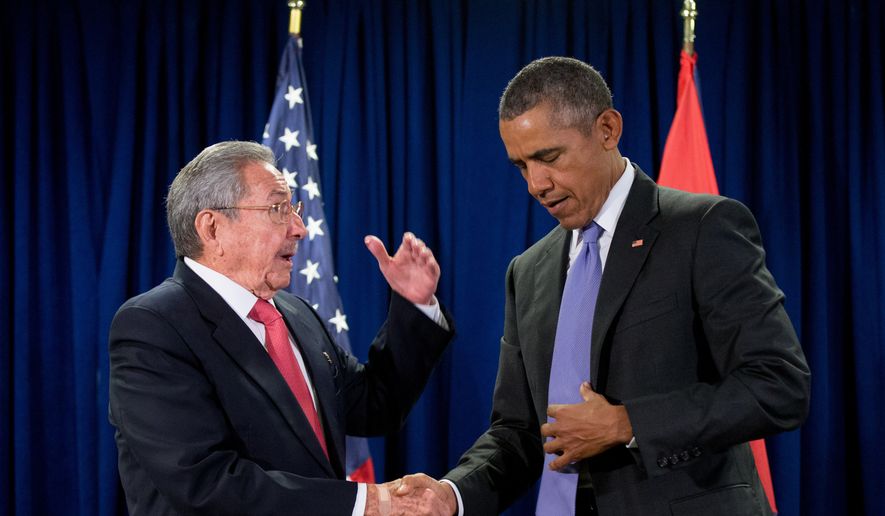President Obama said he hopes to make a landmark visit to Cuba before he leaves office if he can visit with pro-democracy dissidents as part of the trip, adding he doesn’t view communist Cuban President Raul Castro as an “ideologue.”
“If I go on a visit, then part of the deal is that I get to talk to everybody,” Mr. Obama told Yahoo News in an interview published Monday. “I’ve made very clear in my conversations directly with President Castro that we would continue to reach out to those who want to broaden the scope for, you know, free expression inside of Cuba.”
He said Mr. Castro, the 85-year-old younger brother of Cuban Revolution leader Fidel Castro, “is suspicious of full democracy.”
But the president also told correspondent Olivier Knox, “I do see in him a big streak of pragmatism. In that sense, I don’t think he is an ideologue.”
Mr. Obama, who normalized relations with Cuba this year after more than a half-century of Cold War isolation, said he would make a decision on whether to travel there in the next few months.
Mr. Obama also acknowledged that the accelerating resumption of trade ties with Havana after a 50-year embargo will at least in part help to prop up the Castro regime.
SEE ALSO: White House touts Obamacare in year-end push
“There are going to be certain sectors of the economy where we think, if there’s some modification of the application of the embargo, the Cuban people will benefit directly,” he said, but “there are going to be some areas where it could prop up, you know, certain cronies of the regime, but not necessarily have widespread impact.”
Separately, Cuba on Monday reached a breakthrough agreement with a group of foreign creditors over billions of dollars in unpaid debt dating back 25 years, The Associated Press reported.
The Paris Club of creditor nations announced a deal Monday under which creditors will cancel $8.5 billion in overdue interest payments, in exchange for a promise by Cuba to pay off $2.6 billion of the original debt over the next 18 years. The agreement is seen as critical to Havana’s attempts to repair its finances and attract major new foreign investment capital.
Mr. Castro has been working to improve relations with creditors as he tries to modernize and open up the communist island’s economy, which defaulted on its debts in 1986 and was devastated by the 1991 collapse of the Soviet Union, the AP reported. The U.S. maintains an economic embargo against Cuba, and is not among the creditor nations.
The group of Cuban creditors includes: Australia, Austria, Belgium, Canada, Denmark, Finland, France, Italy, Japan, the Netherlands, Spain, Sweden, Switzerland and Britain.
Meanwhile, a bipartisan group of elected officials from Kansas wrote to Mr. Obama Monday to urge him to “bear in mind the concerns and thoughts of the citizens of Kansas” before he considers transferring terrorism detainees from the Guantanamo Bay detention center in Cuba to Fort Leavenworth.
SEE ALSO: Feds to require drone owners to register
“The people of Leavenworth, Kansas — regardless of political parties — are strongly against the plan to close the Guantanamo Bay detention center and transfer detainees to American soil,” they wrote. “We urge you to consider their thoughts and concerns before taking any executive actions to follow through on your plans.”
Mr. Obama has been unable to carry out a campaign pledge from his first election in 2008 to close the detainee facility, in the face of bipartisan resistance in Congress to transferring some of the most notorious terrorists imprisoned there to the U.S. mainland.
⦁ This article was based in part on wire service reports.
• Dave Boyer can be reached at dboyer@washingtontimes.com.




Please read our comment policy before commenting.